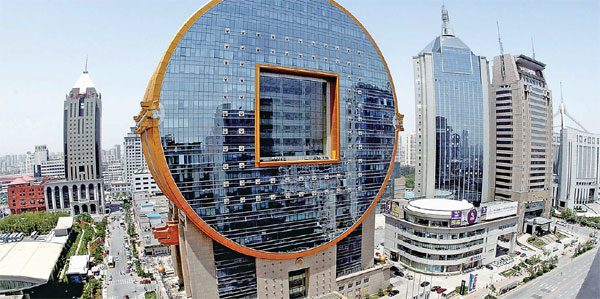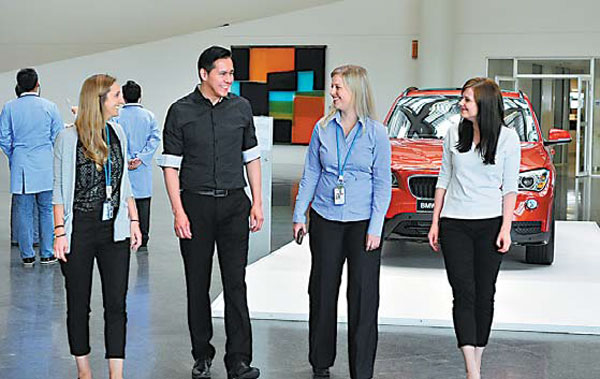City aims to don its regal crown again
Updated: 2015-06-26 06:40
By Hu Haiyan and Wu Yong(China Daily Europe)
|
|||||||||||
German know-how is encouraging Shenyang to dream of its manufacturing days of glory
Martin Hass has been to Shenyang many times, yet the German businessman says he still cannot arrive in the capital of Liaoning province without feeling a certain frisson.
"Every time I find there is more business potential to tap here," says Hass, founder and chief executive of the German consulting company Staufen AG.
|
The cityscape of Shenyang. By the end of last year, 132 Germany companies had been given approval to set up operations in Shenyang, with total foreign direct investment of $1.25 billion. Lian Yong / China Daily |
|
People visit the BMW Brilliance Automotive joint venture in Shenyang. |
His excitement is all the more palpable in the city's manufacturing center, Tiexi industrial district. "Shenyang has a very solid manufacturing base, and it obviously opens a window for German companies to enter China's huge market."
Hass was speaking during a visit by German companies to the city, during which the Shenyang and China-German Intelligent Manufacturing Innovation Forum, organized by the local government, was being held. Shenyang, once the imperial seat of the Qing Dynasty (1644-1911), then the manufacturing king of emerging China, is now on the brink of a new era, the city hopes, by attracting more foreign investment. The trip by the German businesspeople is aimed at introducing to potential visitors, from Germany and China, Tiexi district, which plans to set up a China-Germany equipment manufacturing industrial park.
The park would stretch across 48 square kilometers and consist of four major industries: Intelligent manufacturing, advanced machinery manufacturing, automotive manufacturing, and industrial services.
"Staufen has worked with many local companies," Hass says. "They have a global vision that offers great opportunities to German companies. The new park offers even more opportunities for us to invest here and work with local companies."
One of Staufen's partners is Shenyang Machine Tool Group, a state-owned enterprise that has four overseas operations. The company is said to be the world's largest machine tool maker in terms of sales, turning out 80,000 machine tools a year. Shenyang Machine Tool Group bought the German firm Schiess AG, a 150-year-old heavy-duty machine manufacturer, in 2004, and in the ensuing 10 years, the number of Schiess' employees has risen from 120 to 365.
Shenyang Machine Tool Group set up a German subsidiary in Frankfurt in 2010, and Schiess' advanced manufacturing technology and its brand and marketing channels have helped Shenyang Machine Tool Group go global.
Since buying Schiess, the Chinese company has done research and development in Germany, says Zhao Biao, president of Shenyang Machine Tool Group.
"The company aims to innovate with its products and wants to work with German companies more in producing components," he said in introducing his company's products to the forum.
Li Songlin, director-general of Tiexi industrial district, says German companies are globally renowned for their manufacturing, and the Sino-German industrial park is of strategic significance for Tiexi's development. "German companies have many high-end technologies, and the Chinese market is huge. Tiexi has a solid industrial foundation. It's a time-honored industrial center in China. Shenyang also boasts a rich talent pool and can open the door for German companies coming to China."
High-end technology is also vital to Tiexi's transformation as Internet Plus and Industry 4.0 unfold, Li says, referring to China's and Germany's plans in upgrading industry. Many companies in the district are huge but lack advanced manufacturing capabilities, he says. "We are not blindly introducing companies to the district. We want to bring in German companies connected with the districts' current industry mix or companies, such as Kuka Robot Group, that fit in with high-end manufacturing. Bringing in foreign companies is akin to letting a fox into the hen house, he says, but "it can pay off because it will increase competition and benefit the domestic market.
"As we work together, Tiexi will become an area in China that stands out because of its high-end manufacturing."
Pan Liguo, mayor of Shenyang, says that China and Germany are strong in manufacturing, and there is huge potential for the two sides to work together, the Sino-German industrial park being a prime example.
"Areas in which we can work together include high-end manufacturing, environmental protection and new energy. This is a great chance for Chinese companies to bring in high-end technology to produce competitive products and expand markets at home and abroad."
Since 2003, when BMW set up the BMW Brilliance Automotive joint venture in Shenyang to produce and distribute its vehicles in China, the city has cultivated ties with Germany. By the end of last year, 132 Germany companies had been given approval to set up operations in Shenyang, with total foreign direct investment of $1.25 billion (1.12 billion euros). Fifty-four Germany companies now operate in Shenyang. German investment in Shenyang is mainly in automotive and components manufacturing, electrical equipment and pharmaceuticals.
Last year, trade between Shenyang and Germany was worth $5 billion, almost 20 percent more than the year before, and higher than for any other country or region that does business with the province.
"German trade has greatly helped Shenyang grow," says Liang Jing, of the Shenyang Municipal Bureau of Foreign Trade and Economic Cooperation.
"The city is being rejuvenated, and there are many areas in which we can work together more closely. Tiexi and Shenyang as a whole are ushering in a new era."
Liu Ce contributed to this story.
(China Daily European Weekly 06/26/2015 page23)
Today's Top News
EU, China must turn words into deeds
Greek doors are open to investment
Gunmen kill 27 in attack on Tunisian coastal resort
China opposes Dalai Lama UK appearances
Severed head found in French attack
France orders nationwide clampdown on Uber
No rest until sweeping victory against drugs, Xi says
High-tech seen as promising investment target
Hot Topics
Lunar probe , China growth forecasts, Emission rules get tougher, China seen through 'colored lens', International board,
Editor's Picks

|

|

|

|

|

|








